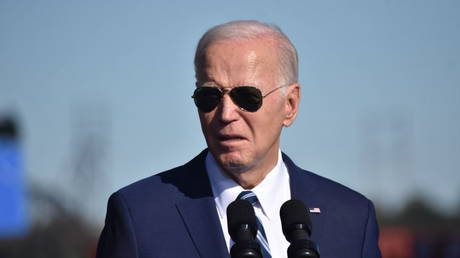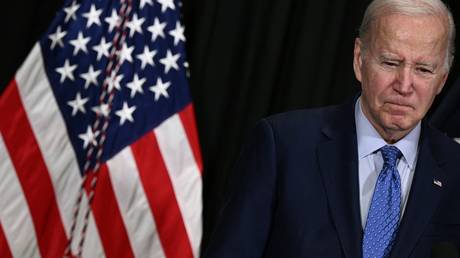ARTICLE AD BOX
The US president’s tough talk is laying the ground to blame Republicans for “losing Ukraine”
The president of the United States has caused a stir. Speaking to Congress, Joe Biden brought up the possibility of “American troops fighting Russian troops.”
Biden, of course, has repeatedly had problems staying on script or keeping his thoughts straight, resulting in embarrassing gaffes, such as calling his Vice President Kamala Harris a “great president” or mixing up Ukraine and Iran.
However, in this case, his delivery was reasonably coherent. His statement was deliberate, and he even repeated it to make sure his audience fully appreciated its gravity.
No wonder it raised eyebrows. A war between America and Russia, would feature the two largest – by far – of the world’s nine nuclear powers. And others, such as Great Britain or China, for instance, could be drawn in as well because such a conflict would easily turn into a world war. Even the conventional arsenals of Washington and Moscow would guarantee devastation, at least in Europe and probably elsewhere, too.
Yet it is important to understand the context of Biden’s remarks and to be precise about what he said – and what he did not say.
Regarding the context, the American president is on the defensive, not so much against Russia as against the Republicans. They are steadfastly refusing to pass a spending bill that is mostly a vehicle to transfer yet another whopping $61 billion of aid to Ukraine. That would come on top of a current – as of October – total of $116 billion already approved by the American Congress in response to the war in Ukraine.
The opposition to releasing more funding has more than one reason. Republicans are explicit about the fact that they are using the administration’s request as leverage. They want concessions to their ideas about hardening America’s borders against immigration. Since the White House will not play ball, Republicans will no longer cooperate on money for Ukraine. In that sense, this is just everyday politics: tough horse-trading cloaked in overblown rhetoric.
Read more Joe Biden’s Washington Post op-ed shows the US never learns its lessons
Joe Biden’s Washington Post op-ed shows the US never learns its lessons
But that marks a momentous shift. The West’s proxy war in Ukraine used to be exempt from politics as usual, ideologically elevated to a plane of almost religious significance. Those days are well and truly over. Republicans clearly fear no electoral repercussions for treating this issue as just another bargaining chip. And they are right. Polls show declining support for the war among American voters. Even in August, a majority were already against spending more money on it. Among Republican voters, this position is preponderant.
No wonder Ukrainian President Vladimir Zelensky has canceled his already scheduled remote appearance before Congress. He is no longer treated as special, and his pleas would have made no difference, leaving him with nothing but additional public humiliation.
At the same time, the demotion of the proxy war from a sort of holy war for Western “values” (whatever those may be) to a tradeable item could not have happened without the failure of Ukraine and its sponsors on the battlefield. The Republicans’ intransigence and Biden’s escalating rhetoric are the result of a real, realistic, and by now openly admitted sense that this is likely to be a lost cause.
This brings us back to the question of what exactly the American president has actually said. In essence, he has delivered two key points. One was his unfounded, if popular, guess – presented with the usual aplomb as certainty – that if Russia wins the war in Ukraine, it will inevitably go on to attack other countries. And since Biden also assumes that Moscow’s future targets would include NATO member states – clearly in Eastern Europe, in particular – he concluded that such a Russian attack would trigger America’s treaty obligation to fight Russia directly.
Of course, experts at least know that even NATO’s famed Article Five is not the hair trigger many believe it to be. In reality, according to the letter of the NATO treaty, member states do not automatically have to go to war when another member state is attacked. But it is a political fact that NATO’s real-world credibility rests on the idea that its members will defend each other militarily and without hesitation.
Hence, Biden’s warning that if Ukraine loses, America and Russia could end up at war both is and is not about Ukraine. It is, because Ukraine’s looming defeat is its trigger. It is not, because Biden has not threatened such a fight in or over Ukraine. Instead, he has not only made clear who Washington claims to be ready to defend by going to war with Moscow but also who it will not defend in that manner, namely Ukraine. For Kiev, this must be bitter. But it was predictable. The Zelensky regime allowed the West, led by the US, to use its country as a pawn – good enough to bleed profusely but not good enough for membership of the club. What Biden has said is simply a summary of that sad, cruel, and humiliating fact. In other times, Zelensky would have had only one honorable thing left to do. He’ll probably go for a golden exile instead.
On the surface, the American president seems to still try to avert Ukraine’s defeat. But that is deceptive, for two reasons. Biden’s talk may sound like an attempt to pressure the obstinate Republicans into finally coughing up the money to save the day. But, in reality, it is more likely that the president or those around him know that the day cannot be saved anymore. Hence, in reality, this warning is an early move in the blame game. Once Ukraine is defeated, the question “who lost Ukraine” will poison American politics, perhaps, depending on the precise timing of that defeat, even during a presidential election.
Biden is merely preparing the ground for blaming the Republicans for what will be the result of his administration’s arrogant high-risk policy. Will that work? Probably not outside Democratic true-believer circles.
Read more Would anything change for the US and the world if Biden wasn’t president?
Would anything change for the US and the world if Biden wasn’t president?
And then, last and perhaps really least, there is a message to Washington’s NATO “partners” in Europe. “Yes,” it runs, “we are about to lose our signature proxy war against Russia; yes, everything went wrong, from economic sanctions (which made Russia stronger instead of weaker) to military support (which showed Moscow that Western tanks also “burn,” in Russian President Vladimir Putin’s laconic terms); and yes, we have over-extended ourselves and revealed how weak we really are in every way possible. But please don’t worry. If push comes to shove, you – unlike Ukraine – are still safe because you – unlike Ukraine – are inside the club. For you, we would really, really fight. Honest.”
What a message, once unpacked. Even on its own terms, it reeks of despair and bluffing. And if it’s not a bluff, then what a promise: Don’t worry. If you are attacked, there will be World War Three.
The reality is that the Western gamble in Ukraine has done irreversible damage – to the West (apart from Ukraine, of course). NATO has dealt a crushing and probably lasting blow to its own credibility. The West’s – and really Europe’s and the world’s – real hope does not lie in American words about resolve. Ask in Kiev: they were fed the same “with-you-to-the-end” shlock. And Article Five cannot be relied on to make the difference, because the US will only ever consult its own – usually misguided – self-interest, and its NATO “allies” (vassals, really) would be naive to rely on it. Berlin even might; Paris, for instance, not so much. No, the world’s real hope lies in how silly Biden’s premise is. Moscow would be foolish to attack one European NATO member state after the other. And unlike the West, Russia recently has given very few signs of being foolish. It is, in other words, Russia’s rationality that a proxy-defeated NATO-Europe will have to rely on. How ironic.
.png)
 1 year ago
11
1 year ago
11








 English (US)
English (US)